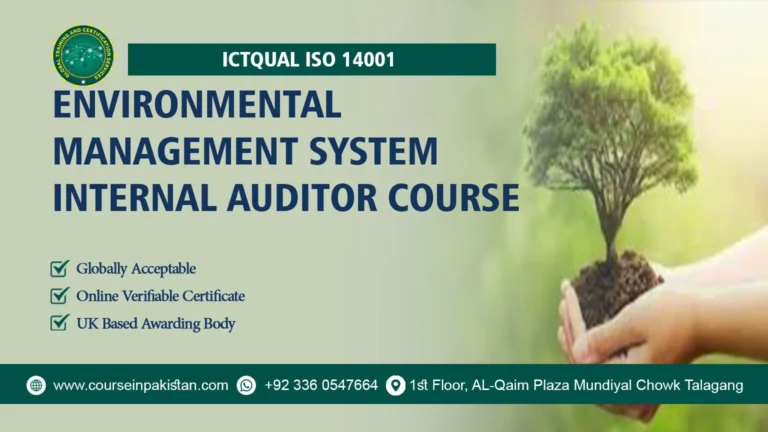
ICTQual ISO 26000 Social Responsibility Management System Internal Auditor Course
In the contemporary business landscape, social responsibility has become a cornerstone of organizational ethics and sustainability. Companies worldwide are increasingly adopting frameworks like ISO 26000 to ensure they operate in a socially responsible manner. If you’re passionate about promoting ethical business practices and seeking to play a pivotal role in ensuring compliance and improvement, the ISO 26000 Social Responsibility Management System Internal Auditor Course offers a valuable pathway to develop specialized expertise.
Course Introduction
The ISO 26000 Social Responsibility Management System Internal Auditor Course is designed to equip participants with the knowledge and skills required to audit and evaluate an organization’s implementation of social responsibility practices based on the ISO 26000 guidelines. This course not only enhances your auditing capabilities but also deepens your understanding of corporate social responsibility (CSR) principles and their application in diverse organizational contexts.
Course Overview
This comprehensive course covers key aspects of social responsibility management systems, emphasizing auditing techniques, compliance assessment, and continuous improvement strategies. Participants will engage in practical exercises and case studies to gain hands-on experience in auditing against ISO 26000 standards, preparing them to contribute effectively to their organization’s CSR initiatives.
Course Benefits
- Specialized Expertise: Develop expertise in auditing social responsibility management systems based on ISO 26000 guidelines.
- Career Advancement: Enhance your professional credentials and career prospects in the field of CSR and auditing.
- Organizational Impact: Contribute to improving organizational sustainability and ethical practices.
- Global Recognition: Gain recognition for your ability to audit and assess CSR practices aligned with international standards.
Course Study Units
The curriculum typically includes modules such as:
Learning Outcomes
Introduction to Social Responsibility
- Learning Outcomes:
- Understand the concept of social responsibility and its significance in organizational contexts.
- Identify key stakeholders and their expectations related to social responsibility.
- Appreciate the benefits of integrating social responsibility into business strategy.
- Recognize global trends and frameworks guiding social responsibility practices.
Understanding the ISO 26000 Standard
- Learning Outcomes:
- Familiarize with the structure and content of the ISO 26000 standard.
- Interpret the core principles and guidance provided by ISO 26000.
- Apply ISO 26000 principles to assess and improve organizational practices.
- Differentiate between compliance with ISO 26000 and other related standards.
Internal Auditing Principles
- Learning Outcomes:
- Grasp the fundamental principles and objectives of internal auditing.
- Apply auditing techniques to assess adherence to social responsibility standards.
- Evaluate the effectiveness of internal controls related to social responsibility.
- Demonstrate proficiency in planning, conducting, and reporting internal audits.
Audit Criteria and Compliance Assessment
- Learning Outcomes:
- Develop audit criteria based on ISO 26000 principles and organizational context.
- Conduct compliance assessments to measure conformity with social responsibility standards.
- Identify non-conformities and recommend corrective actions.
- Provide feedback to stakeholders on audit findings and compliance status.
Risk Assessment and Mitigation Strategies
- Learning Outcomes:
- Identify social responsibility risks within organizational operations.
- Utilize risk assessment methodologies to prioritize risks based on severity and likelihood.
- Develop mitigation strategies to address identified risks effectively.
- Implement controls to monitor and reduce social responsibility risks over time.
Stakeholder Engagement and Communication
- Learning Outcomes:
- Recognize the importance of stakeholder engagement in social responsibility initiatives.
- Develop strategies to effectively engage stakeholders throughout the audit process.
- Communicate audit findings and recommendations clearly and transparently.
- Foster trust and collaboration with stakeholders to enhance social responsibility outcomes.
Measuring Social Impact
- Learning Outcomes:
- Define key performance indicators (KPIs) to measure social impact.
- Collect and analyze data to assess the effectiveness of social responsibility initiatives.
- Interpret findings to demonstrate the positive impact of organizational practices on stakeholders.
- Adjust strategies based on impact assessment results to optimize social responsibility outcomes.
Continuous Improvement and Reporting
- Learning Outcomes:
- Establish mechanisms for continuous improvement of social responsibility practices.
- Implement feedback loops to integrate lessons learned from audits into organizational processes.
- Develop comprehensive reports on social responsibility performance, including strengths, weaknesses, and opportunities for improvement.
- Engage stakeholders in the review and improvement of social responsibility strategies and initiatives.
These learning outcomes collectively equip participants with the knowledge, skills, and tools necessary to effectively audit and enhance social responsibility within organizations, aligned with ISO 26000 standards and best practices.
Who is This Course For?
The ISO 26000 Social Responsibility Management System Internal Auditor Course is suitable for:
- Auditors: Looking to specialize in auditing social responsibility management systems.
- CSR Managers: Responsible for implementing and managing CSR initiatives within organizations.
- Quality and Compliance Professionals: Interested in expanding their auditing skills to include social responsibility.
- Consultants: Advising organizations on CSR strategy and compliance.
Future Progression for This Course
Completion of the ISO 26000 Social Responsibility Management System Internal Auditor Course opens avenues for:
- Advanced Auditing Roles: Progress to senior auditing positions focusing on CSR and sustainability.
- CSR Management: Lead CSR initiatives and strategies within organizations.
- Consultancy: Provide specialized consultancy services to organizations aiming to enhance their social responsibility practices.
- Further Education: Pursue advanced certifications or degrees in CSR, sustainability, or auditing.
The ISO 26000 Social Responsibility Management System Internal Auditor Course equips professionals with the expertise to audit and evaluate social responsibility practices based on internationally recognized standards. By completing this course, you not only enhance your career prospects but also contribute to fostering a culture of corporate responsibility and sustainability within organizations. Embrace the opportunity to make a meaningful impact on societal well-being and organizational success with this specialized qualification.






